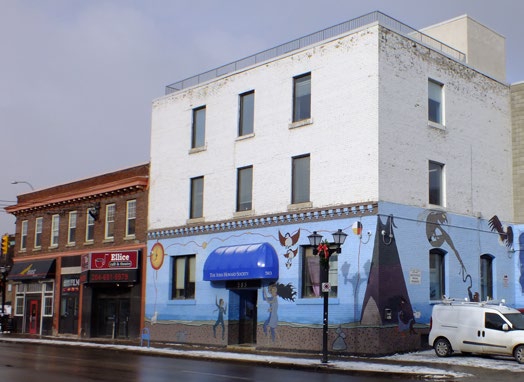By Erika Shaker
In January, Manitoba’s education minister Kelvin Goertzen announced the creation of a commission to review the provincial school system and propose a ‘“renewed vision for kindergarten to Grade 12 education,” to “ignite change” to existing systems, structures and programs’.
By Sarah Cooper
What makes social housing ‘social’? In part, social housing is different from private-market housing because it intentionally provides low-cost housing for low-income households. But it is also a way of taking housing out of the market. It’s a way of keeping housing affordable, and of stabilizing housing as shelter, by removing the potential for speculation. And, it is provided collectively through community-based organizations and government programs, and funded collectively through taxes and government spending.
By Carlos Sosa, Zach Fleisher, and Sara Atnikov
First published in the Winnipeg Free Press April 12, 2019
For years, an open secret in Winnipeg has been the poor quality of service associated with Transit Plus (previously Handi-Transit), which exists to provide a parallel Winnipeg Transit for those with disabilities. The service provides transportation to approximately 7,500 people a year. Due to problems with the services, the Independent Living Resource Centre (ILRC) was able to, with the assistance of the Public Interest Law Centre (PILC), submit a complaint to the Manitoba Ombudsman.
By Anne Lindsey
Offer money to leaders in a cash-poor community to gain support for a resource extraction project. Publicly shun and disenfranchise individuals who don’t agree. Deceive people into signing their support without full information. Divide the community. Commence destructive preparation of the project site before proper decision-making processes are complete…Situate this project on traditional indigenous territory.
By Dele Ojewole
First published in the Winnipeg Free Press Thursday April 4, 2019
At a time when other jurisdictions are finding ways to invest in post-secondary education (PSE) and healthcare, the Manitoba government is doing the opposite, effectively making higher education out of reach for those who need it most. Manitoba raised the cap on PSE tuition increases to 5% plus inflation – as a result students across the province are seeing tuition increases of upwards of 6.6% this September– and public funding to PSE is shrinking – students are subsidizing more of the cost of education. It’s truly disappointing to see this government’s lack of awareness toward the value of post-secondary education and what it can do to give Manitobans a better future.
 By Brianne Goertzen
By Brianne Goertzen
The overhaul of Manitoba’s health care system has been met with repeated calls to slow down from those on the front lines of care. The consistent and persistent stories from patients and front line workers alike detailing chaos and upheaval within the health care system are numerous.
However, the province is going full steam ahead with their overhaul and is paying little attention to the concerns of workers and Manitobans alike. The overhaul and newly introduced legislation will continue to erode and worsen health services we all rely on.
Recently, the head of the Winnipeg Regional Health Authority, Réal Cloutier, emailed a letter to 28,000 staff in an attempt to alleviate concerns and the increasingly low morale plaguing the staff of health facilities. He recognized the decreased morale and general depressed state of health care workers but told them to hang on and that they were experiencing a common feeling dubbed in change management as the, ‘Valley of Despair’.
The ‘Valley of Despair’ refers to the low point people go through when experiencing major workplace changes. They often feel depressed and a loss of control. Réal Cloutier was attempting to alleviate fears and boost morale by assuring them that they would eventually pass through the valley – that hope was on the other side.
On the surface, the letter at least finally acknowledges how staff is feeling, but it does nothing to address the real concerns expressed by a number of health care workers across the province. From overworked neonatal nurses at St.Boniface Hospital, to increases in mandatory overtime, to low levels of staffing, the sudden closure of the Family Medical Centre, closure of the maternity ward in Flin Flon, and impending closures of more ERs: the experiences of those caring for our sick, ill and injured must be taken seriously. Those on the front line know what is and is not working, but despite continued requests to be consulted about changes, they are ignored. Instead they receive Cloutier’s letter, which diminishes their years of experience and ignores their urgent request to slow down on the health care overhaul.
The ‘Valley of Despair’ will undoubtedly widen with the recent introduction of Bill 10. This legislation would amend the Regional Health Authorities Act, to become the Health System Governance and Accountability Act. Contained within this legislation is the creation of ‘Shared Health’ governance. Imagine a pyramid with the Minister of Health Cameron Friesen at the top, followed by ‘Shared Health’ then the regional health authorities and CancerCare Manitoba. Addictions Foundation of Manitoba will be absorbed by Shared Health. The shifts in responsibilities and oversight under this new piece of legislation will impact all stakeholders in the health care system. The consequences of this legislation will be far-reaching, including paving the way forward for a new super agency and a ‘one size fits all’ model of health care service delivery.
We only need to look to Nova Scotia who in 2015 went straight to a ‘super agency’. The change resulted in a number of detrimental consequents to the delivery of care. The inadequate financial resources, the clumsy handling of the amalgamation, and the failure of the one size fits all model has led to negative consequences for Nova Scotians’ access to quality care. A ‘one size fits all’ model is not responsive enough to adapt to changing needs and demands in a given region in a province. For example, currently ER’s in Nova Scotia are issuing pink letters to patients who will not be seen by a doctor in the operational hours of some ERs. The letter details the fact they will not be able to see a doctor today because they have been assessed at a level that is low and they are to come back later. The inability to staff local hospitals in Nova Scotia is chronic with unexpected closures of ERs and the inability of existing staff to take time off. Some groups contend that the new model of health care is leading to higher levels of political interference in the operation of the health care system. The fact that Manitoba is headed down this road is scary and can seriously compromise quality of care. We should be asking is this really the road we should head down? We think not.
If this government is keen on improving health care then why rush through another major change in the administration of health care in this province. Are the political points worth the impact to our delivery of quality, considerate, access to universal Medicare? If this government continues to ignore the continued calls to slow down from our frontline workers, the valley of despair will undoubtedly persist.
Brianne Goertzen is the Provincial Director of the non-partisan Manitoba Health Coalition and a Canadian Centre for Policy Alternatives – Manitoba steering committee member. She serves as a school trustee for Ward 3, River East Transcona School Division.
By Lynne Fernandez
The City of Winnipeg budget is always affected by the provincial budget, but this year Mayor Bowman did his best to reverse that situation. Before, during and after the release of the city’s budget, the mayor lobbied hard to explain the injustices of the premier’s position, and to put his stamp on the provincial budget.
By Robyn Maynard
It is not too soon to express the view that the police killing of Machuar Madut, 43 year old father of three, living with mental health issues, and facing possible eviction – was unjustifiable and unnecessary.
I am unwilling to entertain the notion that Machuar Madut’s death was sad but inevitable. Regardless of the conditions that led to this incident, killing a black man in crisis simply cannot part of what it means to “contain the scene” (the words of a mental health expert interviewed in CBC news).
A recent Ontario Human Rights Commission interim report on racial discrimination by the Toronto police services – found, to much publicity, that black people make up 70 percent of police shootings resulting in civilian death. Less discussed, however, was that the study also showed that black victims of police shootings were less likely to have been carrying weapons, less likely to have threatened and attacked police and fifty percent less likely to have been carrying a gun during the encounter. What this tells us is that not all people need to be killed in order “to contain the scene”. In fact, only some deaths – black deaths – become cast as unpreventable: white men, even those armed with guns – continue, at far higher rates, to be kept alive when they encounter the police, despite being more frequently armed and violent. The ability to keep one’s life while in crisis is a courtesy and a privilege of whiteness, and a basic form of human dignity that black people continue to be denied.
Notice of new address: April 1, 2019
The Canadian Centre for Policy Alternatives
Manitoba (CCPA-MB) is moving.
Please make changes to your mailing/
contact info in your systems.Old address is:
205 – 765 Main St.
Winnipeg, MB
R2W 3N5
Our New Address will be:
301 – 583 Ellice Ave.
Winnipeg, MB
R3B 1Z7
Our phone and emails will remain the same:
204-927-3200
ccpamb@policyalternatives.ca
Office space for rent!
In our new location at the John Howard Society Office Buidling,
583 Ellice Ave. we are renting out one of our offices:
• Office size: 200 sq ft.
• Large 3’x5’ east-facing window
• Shared kitchen space with CCPA staff
• Newly painted
• Parking space
• Central location
• Elevator/accessible
• Cost: $400 a month (all utilities, cleaning, 1 parking spot included)
contact: ccpamb@policyalternatives.ca 204-927-3200 Available April 1, 2019


By Molly McCracken
School trustees are consulting with parents and stakeholders for this upcoming year’s school budgets while they seem to be under attack by the provincial government. Education Minister Goertzen had heated exchange with Winnipeg school trustees on twitter earlier this month regarding education funding and taxes.
Buckle up. With the province’s recently announced review of public education, it seems much of the K- 12 system is up in the air. This will be an important conversation; we all want the best for Manitoba children. Education is the cornerstone of healthy, safe communities and of democracy.




Follow us!